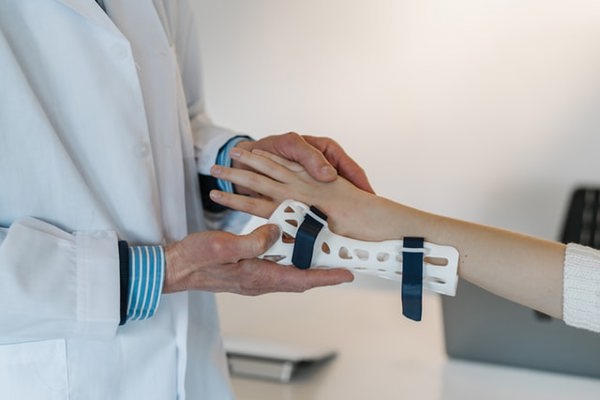It is important to be aware that the figures in the Judicial College Guidelines are a guide, and only consider the value of the injury itself, including any pain and suffering caused. They do not consider the individual circumstances of each claim. At Morton Fraser, we quantify the value of any potential claim by looking at all losses resulting from the accident. In addition to pain and suffering, these may include: (1) past and future loss of earnings; (2) services to cover the cost of assistance provided by family; (3) out of pocket expenses such as travel costs, treatment costs, adaptions to property or mobility aids; and (4) future costs such as nursing care or special equipment, for example, prosthetic limbs which may require to be regularly replaced. In most personal injury cases, it will be necessary to instruct a medical expert to comment on the extent of the injuries sustained and the impact they may have on an individual's future quality of life.
The Judicial College Guidelines are divided into chapters by different body parts and categorise these injuries by their severity. Value is attributed to each type of injury based on a number of factors including the impact the injury has on the individual, any ongoing symptoms, the age of the individual, as well as the affect it has on their ability to work. The guidelines also provide a guide for compensation awards for psychological injuries.
The most severe head injury, one that leaves the individual with little to no function and the need for full-time nursing care may be valued at between £282,010 and £403,990. The level of award within that bracket will be affected by factors such as life expectancy, the extent of the physical limitations, the ability to communicate, and sensory impairment. By contrast, a very minor head injury, such as one that lasts for a limited period of time and causes symptoms such as headaches, could attract an award of between £2,210 and £12,770. Very severe cases of post-traumatic stress disorder are valued between £59,860 and £100,670. A brain injury which causes Grand Mal, a form of epilepsy, could be valued between £102,000 and £150,110.
Shoulder injuries are often associated with neck and arm injuries, and therefore can be more difficult to value. In cases such as this, where there are injuries to multiple body parts, the Court will refer to the guidelines and make case-by-case decisions. The Court will look at the circumstances of each case and consider the impact on the individual. A very severe shoulder injury that results in significant disability will likely be valued at between £19,200 and £48,030. This can be contrasted with a minor soft tissue injury to shoulder that heals within a few months would be valued at up to £2,450. A fracture to the clavicle (the bone which connects the shoulders to the breastplate) is valued between £5,150 and £12,240. This will depend on the extent of the fracture and the level of disability caused.
A very severe knee injury is valued in the range of £69,730 and £96,210. Injuries that fall in this bracket will involve lengthy treatment, the development of osteoarthritis, and considerable loss of function. A leg fracture which extends to the knee joint is valued between £52,120 and £69,730. A more moderate injury, for instance a dislocation or torn cartilage, would likely attract an award between £14,840 and £26,190. A soft tissue injury that doesn't significantly impinge on daily activity and heals within a few months will be awarded in the region of £2,250. At the opposite end of the scale, an injury which necessitates the amputation of both legs above the knee would be valued between £240,790 and £282,010. The amputation of both legs below the knee would be valued slightly lower at between £201,490 and £270,100. The Court would consider factors such as the severity of phantom pains, associated psychological problems, and the future degenerative changes in the hips and spine. The amputation of one leg above the knee would be valued between £104,830 and £137,470. By comparison, the amputation of one leg below the knee would be valued in the range of £97,980 and £132,990.
When it comes to injuries involving the toes the highest award that a Court is likely to make is £56,080; an injury which requires the amputation of all toes is valued at between £36,520 and £56,080. The Court will consider the impact on mobility and the extent of the loss of the forefoot when making a decision. At the other end of the scale, more moderate toe injuries, such as soft tissue injuries and fractures that heal within a short period of time, will likely be valued up to £5,590.
Looking elsewhere in the guidelines, there are a number of other note-worthy comparisons that can be made. For instance, the suggested award for an injury which causes total blindness in both eyes is in the region of £268,720. However, an injury which causes total deafness is likely valued less highly at between £90,750 and £109,650. A total loss of smell can attract awards between £24,990 and £32,900, but a total loss of taste is valued at £19,200 to £24,990. For an injury which results in the total or effective loss of both hands the Court would likely make an award between £140,660 and £201,490. An injury that results in the amputation of both feet is valued in a similar range at between £169,400 and £201,490.
When an individual is deciding whether to pursue a personal injury claim, one of the first steps is to consider the value of the claim. Morton Fraser have an online Compensation Calculator which allows you to check the potential value of the claim for solatium. Whilst some clients are uncomfortable with pursuing a personal injury claim and raising court action, the reality often is that due to the nature of the injury and the financial implications for them and their family, there is no alternative. Our experienced Personal Injury team will take the time to assess your claim and can help you get the compensation you are entitled to. Contact us today on 0131 247 1000 or through our personal injury compensation enquiry form.


